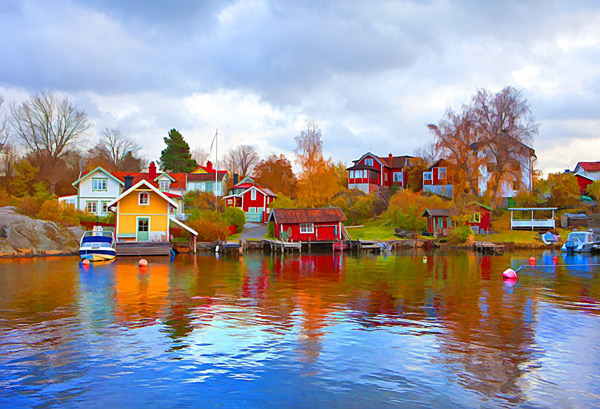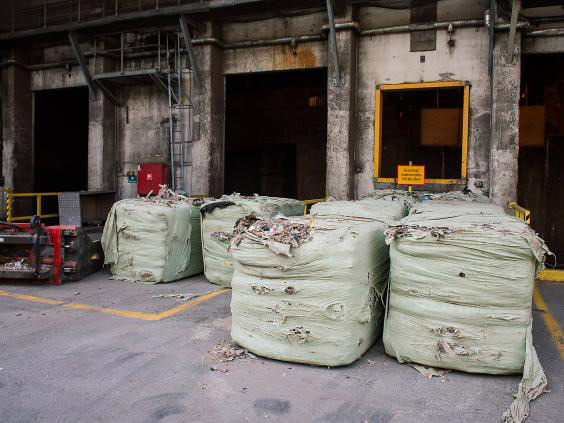别的国家都嫌本国的垃圾太多处理不掉,只有瑞典却在从他国进口垃圾,因为本国垃圾太少,不这样做垃圾回收站只能关门大吉。在瑞典,垃圾焚烧可以转化成能源,在寒冷的冬天给千家万户供暖。
瑞典是如何实现“零垃圾”的呢?这要归功于本国保护环境的文化传统和政府的宣传工作,环保意识深入人心,每家每户产生的垃圾很少,而且还有先进的垃圾回收供热系统。

Sweden is so good at recycling that, for several years, it has imported rubbish from other countries to keep its recycling plants going. Less than 1 percent of Swedish household waste was sent to landfill last year or any year since 2011.
这些年瑞典的环保工作做得太出色了,如今甚至要从其他国家进口垃圾,才能让本国的回收工厂继续运营下去。去年,瑞典送入垃圾场的生活垃圾不足总量的1%,这种情况一直从2011年持续到现在。
We can only dream of such an effective system in the UK, which is why we end up paying expensive transport costs to send rubbish to be recycled overseas rather than paying fines to send it to landfill under The Landfill Tax of 1996.
如此高效的系统在英国是不可想象的。这就是为什么英国人要花费高昂的运输费,把垃圾送到海外的回收站,因为如果运到本国的垃圾填埋地的话,依照1996年垃圾填埋税就要支付罚款。
Why are we sending waste to Sweden? Their system is so far ahead because of a culture of looking after the environment. Sweden was one of the first countries to implement a heavy tax on fossil fuels in 1991 and now sources almost half its electricity from renewables.
为什么要把垃圾送到瑞典?因为瑞典人有保护环境的文化传统,所以他们的系统很先进。瑞典是1991年第一批开始对化石燃料征收重税的国家之一。如今该国近一半的电力供应来自可再生能源。
“Swedish people are quite keen on being out in nature and they are aware of what we need do on nature and environmental issues. We worked on communications for a long time to make people aware not to throw things outdoors so that we can recycle and reuse,” says Anna-Carin Gripwall, director of communications for Avfall Sverige, the Swedish Waste Management’s recycling association.
瑞典垃圾管理回收协会Avfall Sverige的交流主任安娜 凯琳 格里普沃表示,“瑞典人很喜欢拥抱大自然,也知道采取哪些措施来应对环境问题。长期以来,我们都努力和人们进行沟通,好让他们不在户外乱扔垃圾,这样有利于我们对垃圾的回收和再利用。”
Over time, Sweden has implemented a cohesive national recycling policy so that even though private companies undertake most of the business of importing and burning waste, the energy goes into a national heating network to heat homes through the freezing Swedish winter.
在过去的时间里,瑞典推行了一项连贯的全国性回收政策,这样一来,尽管私企承担了大部分垃圾进口和焚烧业务,产生的能源还是能用于国家供暖系统,在瑞典寒冷的冬天里温暖千家万户。
“That’s a key reason that we have this district network, so we can make use of the heating from the waste plants. In the southern part of Europe they don’t make use of the heating from the waste, it just goes out the chimney. Here we use it as a substitute for fossil fuel,” Ms Gripwall says.
格里普沃女士表示:“这是我们建立这一区域系统的主要原因,这样我们才能利用垃圾焚烧产生的热量。欧洲南部的国家不会利用垃圾焚烧来提供热量,而是任凭热量从烟囱冒出去,我们则用它来替代化石燃料。”

Sweden’s heating network is not without its detractors. They argue that the country is dodging real recycling by sending waste to be incinerated. Paper plant managers say that wood fibre can be used up to six times before it becomes dust. If Sweden burns paper before that point it is exhausting the potential for true recycling and replacing used paper with fresh raw material.
也有人对瑞典供暖系统提出质疑。他们认为瑞典焚烧垃圾并不是真正的垃圾回收利用。造纸商表示,在烧毁前,木材纤维还可以循环利用六次。真正的回收是把用过的纸转变为新的原料,如果瑞典在还未充分循环利用前就烧毁纸张,它正在耗尽真正的回收的潜力。
Ms Gripwall says the aim in Sweden is still to stop people sending waste to recycling in the first place. A national campaign called the “Miljo na r-va nlig” movement has for several years promoted the notion that there is much to be gained through repairing, sharing and reusing.
格里普沃表示,瑞典的目标仍然是阻止人们第一时间就把垃圾送去回收站。瑞典有一项持续了好几年的全国性宣传运动Miljo na r-va nlig,该运动宣扬修补、分享和重复利用可以让人们获益多多。
She describes Sweden’s policy of importing waste to recycle from other countries as a temporary situation. “There’s a ban on landfill in EU countries, so instead of paying the fine they send it to us as a service. They should and will build their own plants, to reduce their own waste, as we are working hard to do in Sweden,” Ms Gripwall says.
她表示瑞典从其他国家进口垃圾来回收只是暂时的。格里普沃说:“欧盟禁止成员国填埋垃圾,所以这些国家为了不支付罚款就把垃圾作为一项服务送到我们国家来。他们应该也将会建造自己的回收工厂,减少本国垃圾,就像我们在瑞典努力推行的一样。”
“Hopefully there will be less waste and the waste that has to go to incineration should be incinerated in each country. But to use recycling for heating you have to have district heating or cooling systems, so you have to build the infrastructure for that, and that takes time,” she adds.
她补充道:“希望以后的垃圾会减少,需要焚烧的垃圾能在各国国内焚毁。不过如果想回收垃圾用来供热的话,需要区域供热和冷却系统,所以必须修建相应的基础设施,而修建时间会比较长。”
Swedish municipalities are individually investing in futuristic waste collection techniques, like automated vacuum systems in residential blocks, removing the need for collection transport, and underground container systems that free up road space and get rid of any smells.
瑞典自治区都在各自发展未来主义的垃圾收集技术,比如居民区的自动真空系统免去了垃圾收运,还有地下装载系统,可以避免占用街道和各种气味。
英文来源:独立报
翻译:刘恬(中国日报网爱新闻iNews译者)
编审:丹妮
